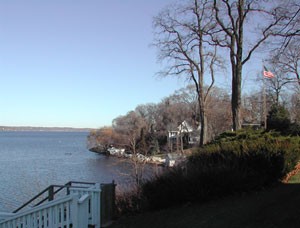For the grace of God, which can save everyone, has now become known, and it teaches us to have no more to do with godlessness or the desires of this world but to live, here and now, responsible, honorable and God-fearing lives. And while we live this life we hope and wait for the glorious dénouement of the great God and of Jesus Christ our savior. For he gave himself for us, that he might rescue us from all our evil ways and make for himself a people of his own, clean and pure, with our hearts set upon living a life that is good. — Titus 2:11-14, JB Phillips
 We spent Thanksgiving at Geneva Lake, Wisconsin where it was insanely cold, at least by Tucson standards. There was a light dusting of snow on the ground, and after walking along the lake I would return home with my nose frozen. At night, we built a fire in the fireplace and went to bed under wool blankets.
We spent Thanksgiving at Geneva Lake, Wisconsin where it was insanely cold, at least by Tucson standards. There was a light dusting of snow on the ground, and after walking along the lake I would return home with my nose frozen. At night, we built a fire in the fireplace and went to bed under wool blankets.
The nearby towns had already decorated their squares and main streets with the lights and greens of the Christmas season. Shop windows were festooned with cheerful ornaments. Wisconsin in winter has a nostalgic feeling about it. Dormant trees, fields bristling with the stubble of harvested corn, shuttered barns, farm equipment dusted with the season’s first snow. Life retreats from the cold even as excited children count down the days to Christmas.
The Christian Advent season is a time of anticipation, of looking ahead to something promised. There are many traditions in the secular Christmas holiday that have no real connection to Christianity, but this growing sense of anticipation as we await the arrival of Santa Claus fits with the spirit of Advent.
Back at the time of the birth of Christ, Israel, too, had been waiting in anticipation. God seemingly had been silent for centuries. No prophetic voices had been heard. Outsiders brought trouble to the land. Syncretism and apostasy were spreading like a virus. The faithful were asking the question we often hear today: Where is God?
We look backwards at Christmas to the birth of this child who would become Jesus the Christ. But this is no mere birthday commemoration for a great man. We don’t celebrate the birth of Abraham Lincoln like this. We celebrate this particular birth so lavishly because it was no mere birth of a great religious thinker.
The proposition of Christianity is that Christmas celebrates the “birth” of God himself.
God, of course, is eternal and could never be “born” in the human sense of the word. He somehow joined himself with human cells, was born a helpless baby and lived among us in the life of the man from Nazareth, Yeshua — Jesus, in our tongue.
God born in a stable. It’s a story that is understandably difficult to swallow, certainly as difficult as a jolly old elf who enters homes through chimneys in the dead of night. But where Santa requires a suspension of disbelief, the incarnation only requires that we believe in… God.
And that isn’t as big a jump as you might think. Either we embrace the rational absurdity that this ancient and unimaginably complex material universe formed by chance — from nothing — or we embrace the mind-blowing alternative — God, an omnipotent and eternal genius wrought it and sustains it. Surely, if you can assent to God, the Bethlehem miracle is small potatoes.
But we’re still looking backwards, aren’t we?
The Advent theme is anticipation, looking ahead. Just as Israel looked ahead to what God might yet do, the lesson of Christmas is that we should be looking ahead, too. God exists. He entered history through the baby Jesus and revealed himself to humanity. Surely that same desire to love and be known still burns hotly in Him today.
It is winter now and life has retreated. Once again, God seems silent and withdrawn. But is He? What is God up to? We wait patiently and live in anticipation.
And who knows? Spring may burst out very early this year.


Lake Geneva is the best.